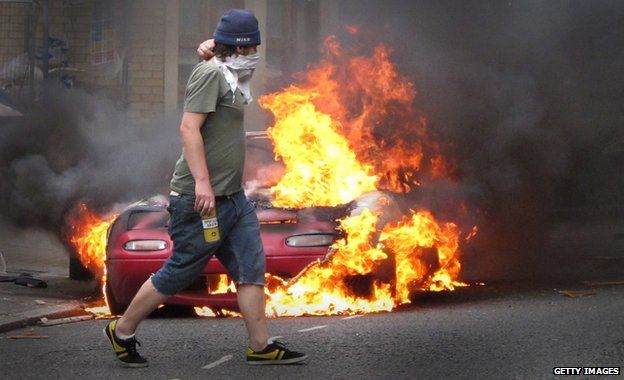Helping the most troubled families in Britain
- Published

In response to the 2011 riots, the prime minister pledged to turn around the lives of tens of thousands of troubled families in Britain. The expensive programme would, he said, put "rocket boosters" under existing interventions. Winifred Robinson has had exclusive access to the scheme.
Efforts to transform some of the most troubled and troublesome families in England are currently under way on an unprecedented scale. Social services departments are using £448m set aside by the government in response to the riots in England in the summer of 2011.
The aim is to intervene directly in the lives of 120,000 families and BBC Radio 4 has been allowed exclusive access to some of this work, meeting some of the families and the professionals trying to help them.
The riots in England saw some of the worst civil unrest for decades. According to the official panel set up afterwards to investigate, more than 12,000 people rioted in 66 different areas, over five days.
Of the 4,000 arrested, nine out of 10 were already known to the police. They were young, three-quarters were 24 or under and some were children. One in five of those convicted was under 18. Speaking outside Downing Street at the time, the prime minister wondered aloud about the family background of the rioters: "The sight of those young people looting laughing as they go," he said, "demonstrated a lack of proper parenting, upbringing, ethics and morals."
He appointed Louise Casey to lead a new Troubled Families Unit. Her budget - £448m - is being shared between local authorities to help the 120,000 most troubled families in England. It works out at roughly £4,000 per family.
It's being spent on an approach known as family intervention, where a single, dedicated worker is assigned to each family. To qualify for help under the programme a family must have a parent out of work, children absent from school and involved in anti social behaviour or crime, although councils have discretion to include families for other reasons, for example where parents are mentally ill.
With family intervention, parents are offered practical help, advice and counselling but in return they must agree to take charge of their own children, imposing firm boundaries and crucially getting them out to school.
And there are sanctions imposed if they refuse - usually the loss of a secure tenancy for anti-social behaviour, court action against parents with children not attending school or even care proceedings where there is serious neglect.
For our documentary we were allowed to sit alongside Louise Casey as she visits family intervention projects across England.
Although the model of intervention she advocates is widely accepted as best practice, the Troubled Families Initiative has been controversial from the start. The number of families to be helped was calculated using research about families in multiple deprivation, whereas the programme is primarily aiming to tackle anti-social behaviour and crime.
Louise Casey has been accused of stigmatising poor families and blaming them for problems that are not really within their control. She prefers to concentrate on the work in hand: "My job isn't to have an academic debate about which ones I start with, I'm much more scared about getting the interventions right with those families."
We have met and interviewed several families and their workers over the past year. All the parents had serious problems including heavy drinking, cannabis use and depression.
One woman we met had 10 children aged between four and 18. She'd separated from her husband who was violent, and the family had lost almost everything they had in a fire. She was drinking and had been served with an eviction notice on her new home because of the behaviour of two of her boys aged 14 and 11.
At one point, the family's rubbish was strewn around the garden.
"They didn't start out on the street as horrible children, or the worst neighbours going, but they became that way," the mother told us. As the problems mounted up they became too much to bear and she had used alcohol to blot them out.
Her family intervention worker pitched in to help sort out the rubbish into the proper recycling bins so that the council would take it away.
"They make you their priority," the mother says. "They told me this is the last port of call, this is what you have got to do. A lot of reason we made it back is because of what we had before. I know my kids and that helped. They made me realise that I was using drink for the wrong reasons and it goes back to you as a person, it's finding you."
For Louise Casey, family intervention is in marked contrast to a system where families are known to several different authorities - school, police, youth justice, social services - and are continually assessed rather than changed.
"It is pulling families towards a sense of responsibility for their own destiny. It is one family, one plan, one worker and there is a deal here, you have some responsibility for that plan, it's not just imposed on you.
"These people are in a bunker everyone is prodding them, judging them and assessing them, no one is jumping into that bunker with them and saying right, you don't like your back garden, let's start with that."
The budget has been shared between areas using the 120,000 figure as a fraction of population and demography. Councils are in the process of identifying their most troubled families and laws have been changed to allow job centres to share data. The work is being expanded so rapidly that there will be 40,000 family interventions in England this year, compared with 11,000 in 2012.